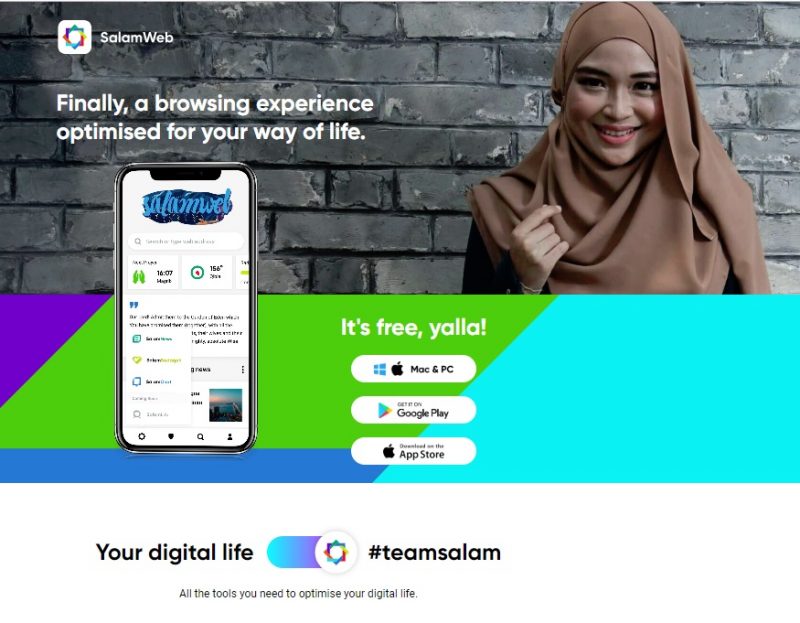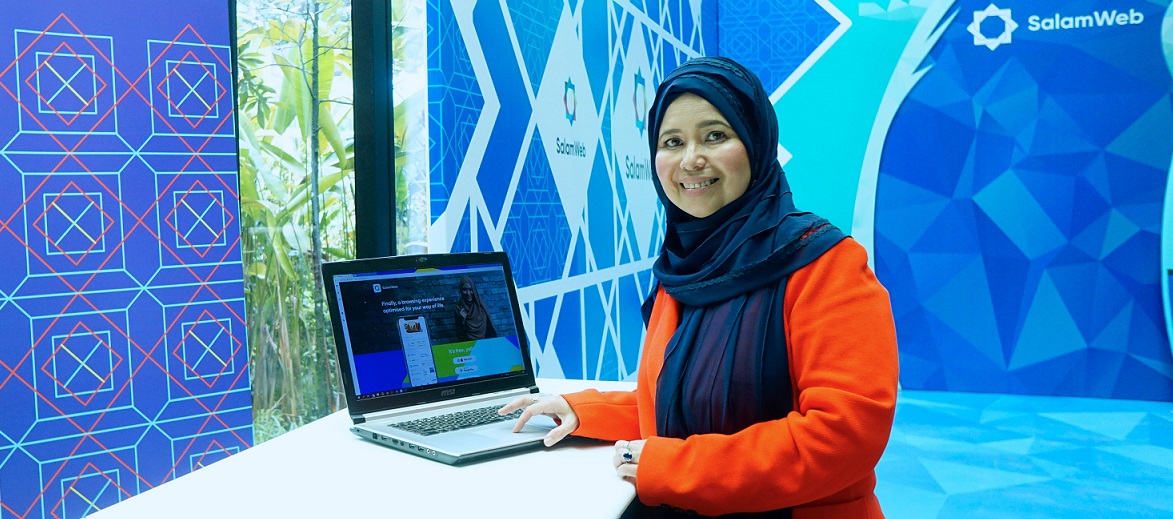A Compliant Web Browser
What if there’s a web browser that is safe and ethical for users of all ages? There is and its managing director, Hasni Mohd Khan, talks about creating the first shariah-compliant web browser in Malaysia, how it works and her target markets.
Before taking the helm at SalamWeb, and kick-starting the web browser in January 2019, Hasni Zarina Mohamed Khan (pictured above) was the deputy CEO for the Halal Industry Development Corporation (HDC) and spearheaded the transformation of HDC and to invigorate the development of the halal industry. A graduate from University of Central England with a bachelor’s degree in electronic engineering, Hasni Zarina Mohamed Khan was among the first 25 women certified by NAM Institute for the Empowerment of Women (NIEW). NIEW was established by the Malaysian Government under the purview of the Ministry of Women, Community and Family Development.
With an extensive 26 years of experience in a diversified corporate industry background, Hasni is an energetic visionary leader with a proven track record in transforming challenges to further bolster business opportunities. Now, Hasni leads the team behind Malaysia’s first shariah compliant web browser. Together with the SalamWeb team, her aspiration was to build the foundation for an ethical digital ecosystem, providing Muslims a platform to browse, socialise and connect with each other in a safe and convenient environment.
Weaving a Web
SalamWeb is a digital ecosystem that empowers Muslims worldwide to discover, connect and contribute in a free, safe online environment. It’s a tool developed based on Islamic principles and fatwa, which has been reviewed by notable scholars and organisations. The SalamWeb browser is the primary service offered by SalamWeb. It’s complemented with other services including SalamNews, SalamChat, SalamSadaqah and other handy applications like qiblat, prayer times, weather and traffic.
The browser also features SalamProtect, which is an embedded advanced content filter that flags content better avoided. Through a tagging mechanism called SalamTag that indicates if a website is appropriate, neutral or inappropriate, users can control and customise their internet browsing experience. This means any harmful content is filtered out and visits to pornographic or inappropriate websites are forewarned with an alert of harmful content ahead.

Other services included are SalamChat, a local chat powered by SalamWeb that brings the community together, and SalamNews, which is a custom news feed aggregated from verified reputable news sources providing a powerful focused snapshot of world events.
However, the most unique feature of SalamWeb is SalamSadaqah. Most of us browse the internet on a daily basis without giving a second thought to how we can use this incredible tool for a larger, more charitable experience. With SalamSadaqah, the everyday internet experience becomes a charitable cause. How? SalamWeb matches every web search or content report made to a donation amount. One of SalamWeb’s guiding principles is to empower a global community. Basically, it fulfils the needs of a community over an individual.
The Dangers of the Web
According to the 2019 Global Digital report by Data Reportal, Malaysians spend a little over eight hours per day on the internet, compared to the global average of six and a half hours. Our world is at an exciting inflection point where the internet has made the world a global village – bringing people and communities together and giving everyone a voice.
But at the same time, the internet can be a source of concern. As an open platform that encourages self-expression, positive connections and sharing, there are individuals who use these same tools to do harm as well. The range of issues is broad, from explicit content like violence, pornography and complex issues such as bullying, hate speech and data privacy.
According to a research by a tech compare and reviews site comparitech.com, 23 per cent of Malaysian parents polled, believed their child has been a victim of cyberbullying at least once in 2018. Out of the 28 countries surveyed, Malaysia was ranked the second worst in Asia, better than India (37 per cent) but worse than Saudi Arabia (19 per cent), China (17 per cent), South Korea (13 per cent) and Japan. The research was conducted last year through 20,793 interviews from March 23 to April 6, and polled adults aged 18 to 64 in the United States and Canada, and adults aged 16 to 64 in all other countries.
Indian parents remained among the most likely to express confidence that their children were cyberbullied at least sometimes. Across Europe and the Americas, it also appears more parents are either becoming aware of their children’s negative experiences with cyberbullying, or their children are increasingly experiencing such attacks online. With these in mind, the aim of SalamWeb was to make the internet a safe place for everyone and encourage connections which are authentic and in line with Islamic values and beliefs.
Salam Web’s Safe Search Filter
SalamWeb browser is inbuilt with a safe search filter which prompts users on harmful, explicit content ahead. The aim isn’t to block or censor but offer users a choice to surf on what matters the most. This function is called SalamProtect, where we encourage our communities to tag content that they deem appropriate and report different online threats.
‘SalamProtect provides freedom to users in deciding which content is appropriate or inappropriate. Controlled and customised by the users through SalamTag that assigns a website appropriate, neutral or inappropriate. The more webpages a user SalamTag, the better it will be for the community,’ added Hasni.
Last Words
Catering to the modern Muslims and other races, SalamWeb’s services are universal and address some very real concerns about the digital world. The benefits can be reaped by concerned individuals, families, parents and caretakers who are worried about their children’s access to pornography, dangerous content and those who are seeking peace of mind in their digital usage.
SalamWeb’s largest usage comes from its home country, Malaysia, and other users from more than 140 countries. Other notable countries include Indonesia, Uzbekistan, Pakistan, Egypt and Morocco. They have also partnered with Malaysian universities to encourage industry-academia dialogue and foster the development as well as growth of the Islamic digital economy. SalamWeb earns its revenue primarily through relevant and ethical advertisements, and revenue based on co-operation with search engines.
